最新牛津7A Unit2 Let’s play sports
- 格式:doc
- 大小:43.00 KB
- 文档页数:9
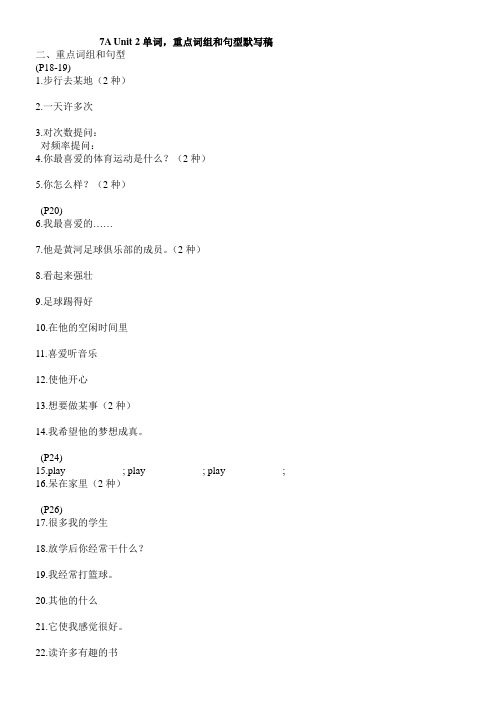
7A Unit 2单词,重点词组和句型默写稿二、重点词组和句型(P18-19)1.步行去某地(2种)_____________________________________________________________________ 2.一天许多次_____________________________________________________________________ 3.对次数提问:_______________________________________________________ 对频率提问:____________________________________________________4.你最喜爱的体育运动是什么?(2种)_____________________________________________________________________ 5.你怎么样?(2种)_____________________________________________________________________ (P20)6.我最喜爱的……_____________________________________________________________________ 7.他是黄河足球俱乐部的成员。
(2种)_____________________________________________________________________ 8.看起来强壮_____________________________________________________________________ 9.足球踢得好_____________________________________________________________________ 10.在他的空闲时间里_____________________________________________________________________ 11.喜爱听音乐_____________________________________________________________________ 12.使他开心_____________________________________________________________________ 13.想要做某事(2种)_____________________________________________________________________ 14.我希望他的梦想成真。
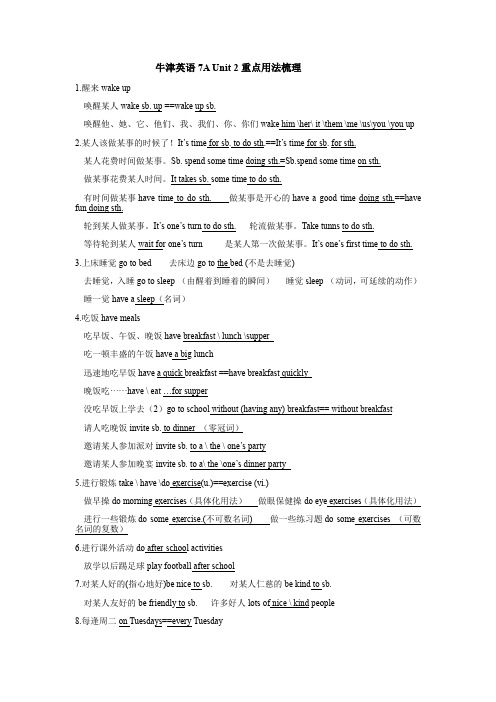
牛津英语7A Unit 2重点用法梳理1.醒来wake up唤醒某人wake sb. up ==wake up sb.唤醒他、她、它、他们、我、我们、你、你们wake him \her\ it \them \me \us\you \you up 2.某人该做某事的时候了!It’s time for sb. to do sth.==It’s time for sb. for sth.某人花费时间做某事。
Sb. spend some time doing sth.=Sb.spend some time on sth.做某事花费某人时间。
It takes sb. some time to do sth.有时间做某事have time to do sth. 做某事是开心的have a good time doing sth.==have fun doing sth.轮到某人做某事。
It’s one’s turn to do sth. 轮流做某事。
Take tunns to do sth.等待轮到某人wait fo r one’s turn 是某人第一次做某事。
It’s one’s first time to do sth.3.上床睡觉go to bed 去床边go to the bed (不是去睡觉)去睡觉,入睡go to sleep (由醒着到睡着的瞬间)睡觉sleep (动词,可延续的动作)睡一觉have a sleep(名词)4.吃饭have meals吃早饭、午饭、晚饭have breakfast \ lunch \supper吃一顿丰盛的午饭have a big lunch迅速地吃早饭have a quick breakfast ==have breakfast quickly晚饭吃······have \ eat …for supper没吃早饭上学去(2)go to school without (having any) breakfast== without breakfast请人吃晚饭invite sb. to dinner (零冠词)邀请某人参加派对invite sb. to a \ the \ one’s party邀请某人参加晚宴invite sb. to a\ the \one’s dinner party5.进行锻炼take \ have \do exercise(u.)==exercise (vi.)做早操do morning exercises(具体化用法)做眼保健操do eye exercises(具体化用法)进行一些锻炼do some exercise.(不可数名词) 做一些练习题do some exercises (可数名词的复数)6.进行课外活动do after-school activities放学以后踢足球play football after school7.对某人好的(指心地好)be nice to sb. 对某人仁慈的be kind to sb.对某人友好的be friendly to sb. 许多好人lots of nice \ kind people8.每逢周二on Tuesdays==every Tuesday在周二on Tuesday 在周二上午、下午、晚上on Tuesday morning \ afternoon \ evening 每周二的上午on Tuesday mornings ==every Tuesday morning9.她是一个很棒的游泳者。
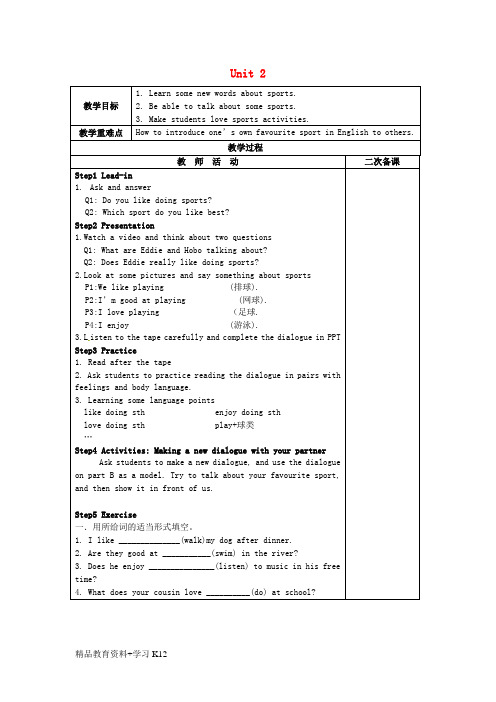

牛津英语7A Unit2 单元知识解析Comic strip and welcome to the unit知识详析.积累拓展➊walk to...意为“步行去....”,to后接地点,相当于:go to...on foot。
如:I walk to school every day.=I go to school on foot every day.我每天步行上学。
[易错警醒]walk to...后如果接副词,则省略to。
如:He walks there at five.他5点步行去那儿。
His bike is broken so he has to walk home.他的自行车坏了,所以不得不步行回家。
❷volleyball用作名词,意为“排球;排球运动”。
如:I like volleyball very much.我非常喜欢排球。
They like playing volleyball on the beach,他们喜欢在沙滩上打排球。
She is fond of playing volleyball.她喜欢打排球。
❸What about...意为.....怎么样”,后接名词、代词或动名词(即v.-ing形式)作宾语。
用于询问情况或征求意见。
如:What about them?他们如何?What about the black one? 那件黑色的如何?What about going shopping?去购物如何?I think this is a good idea. What about you?我认为这是个好主意。
你认为如何?What about money?有关钱的事呢??难句解读1. I walk to my bowl many times a day我每天都往我的饭碗那儿走好多次。
教材P18此处time用作可数名词,意为“次,回”。
如:I call my parents thee times a week.我一周打3次电话给我父母亲。
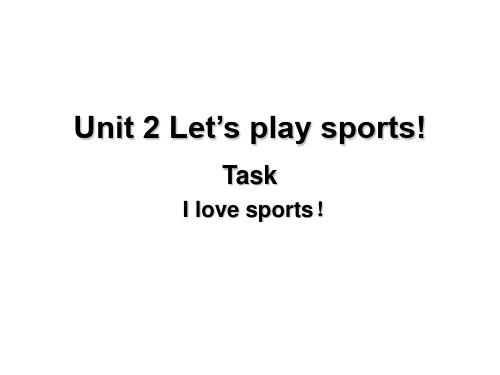
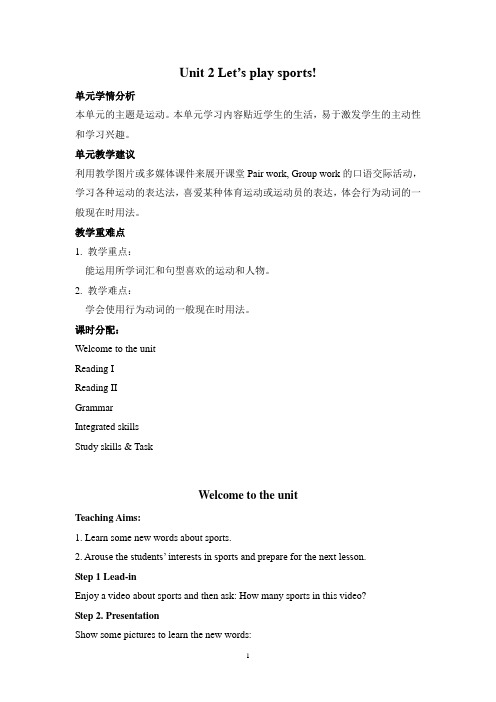
Unit 2 Let’s play sports!单元学情分析本单元的主题是运动。
本单元学习内容贴近学生的生活,易于激发学生的主动性和学习兴趣。
单元教学建议利用教学图片或多媒体课件来展开课堂Pair work, Group work的口语交际活动,学习各种运动的表达法,喜爱某种体育运动或运动员的表达,体会行为动词的一般现在时用法。
教学重难点1. 教学重点:能运用所学词汇和句型喜欢的运动和人物。
2. 教学难点:学会使用行为动词的一般现在时用法。
课时分配:Welcome to the unitReading IReading IIGrammarIntegrated skillsStudy skills & TaskWelcome to the unitTeaching Aims:1. Learn some new words about sports.2. Arouse the students’ interests in sports and prepare for the next lesson.Step 1 Lead-inEnjoy a video about sports and then ask: How many sports in this video?Step 2. PresentationShow some pictures to learn the new words:walking n. 散步,步行really adv. 的确,确实bowl n.碗,盆time n.次,回tennis n. 网球volleyball n. 排球go swimming 去游泳Step 3 Listen and answerListen to the conversation between Eddie and Hobo, then answer:1. What does Eddie like doing?He likes walking.2. Does he really like sports?No, he doesn’t.3. Fill in the blanks.Eddie says he l_________ sports because he likes w_________. He tells Hobo that he walks to his b___________ many times a day. In fact, he doesn’t r_________ like sports at all. He just likes e___________ food.Step 4 Read and actRead aloud the conversation in groups, then present the comic strip on the screen for the Ss to act out the conversation.Step 5 Talking about sports:1. Complete Part A.We like playing ____________.I’m good at playing ___________.I love playing _________.I enjoy ____________ .2. Listen and answer. Amy and Simon are talking about sports.1) What sport does Simon like?2) What about Amy?3. Talk about sports, using Part B as a model.A: I like ... What’s your favourite sport, …?B: I like ...A: Do you often …?B: Yes. / No. I often .... What about you?A: I … every week.Step 6 Play a gameOne of the students acts to play his / her favourite sport in the front. The others try to guess what kind of sport it is.Step 7 Language points1. Oh, really?句中的really常用于答话中,表示感兴趣或惊讶。
7AUnit 2知识点梳理(下)复习导入重点单词散步,步行 walking 的确,确实 really网球 tennis 排球 volleyball享受…的乐趣,欣赏,喜爱 enjoy 成员 member梦想,梦 dream 希望 hope周末 weekend 队,组 team比赛,竞赛 match 偶像,英雄 hero重点短语play sports 做运动 of course 当然in one’s free time 在某人空闲的时间 go swimming 去游泳listen to music 听音乐 come true 变为现实,成为事实stay at home 待在家里 at/on weekends 在周末a lot of 许多,大量 talk about/of 谈论知识点梳理一.词汇&短语:WORDS&PHRASES1.He/She/It likes sports. 他/她/它喜欢运动。
含有行为动词的一般现在时,当句子的主语是第三人称单数时,谓语动词也用第三人称单数形式,其他情况谓语动词用动词原形。
我来自中国,她来自美国。
I come from China and she comes from America.她对孩子很有耐心,所以她能成为一位好老师。
2. He/She/It does not like sports.他/她/它不喜欢运动。
含有行为动词的一般现在时的否定句型:主语+don’t/doesn’t+ 动词原形+其他。
我根本不喜欢足球。
I don’t like soccer at all.他不生活在中国。
He doesn’t live in China.3. Do I/you/we/ they like sports?我/你(们)/我们/他们喜欢运动。
此句是含有行为动词的一般现在时的一般疑问句形式,其构成可归纳为:Do/Does+主语+动词原形+其他?当主语为第三人称单数时用does。
Unit 2 Let’s play sports课堂笔记1. Do you like any sports? 你喜欢一些运动吗?some用在肯定句中,any用于一般疑问句和否定句中。
eg. Tom has some interesting books.Does Tom have any interesting books?Tom doesn’t have any interesting books.2. I walk to my bowl many times a day. 每天我走向我的碗很多次。
walk to sp(某地)=go to sp on foot 步行去某地ride to sp =go to sp by bike骑车去某地drive to sp = go to sp by car开车去某地fly to sp = go to sp by plane/air乘飞机去某地eg. Jim often walks to school. Jim 经常步行去学校walk home/there/here(home/there/here前不加to)stay at home / stay here / stay there呆在家里/这儿/那儿many times a day 一天许多次eg. 一年三次three times a day一个月两次two times/twice a month这里time 表示次数,是可数名词。
当其表示时间时,是不可数名词。
3. What’s your favourite sport?=What sport do you like best? 你最爱什么运动?play sports= do sports = have sports 进行体育活动(sports用复数)4. What about you? =How about you? 你怎么样?/你呢?What/how about doing sth? 做某事怎么样?eg. what about going shopping today?5. a member of … = a part of ...,…的一员eg. Amy is a member of the Swimming Club.=Amy is in the Swimming Club. Amy是游泳俱乐部的一员。
Unit2 Let’s play sportsComic strip and Welcome to the unit教学目标1. 掌握常见的几种体育运动的名称。
2. 使用适当的语言谈论体育运动。
教学内容四会内容:词汇:walking really bowl time tennis volleyball词组:go swimming句型:Do you often play football? I often play football after school. What about you? 三会内容:句型:Really? I walk to my bowl many times a day.教学步骤Step1 Free TalkDo you like sports?What’s your favourite sports?Step2 PresentationPlaying sports is good for us. I hope every one of you can keep exercising.Now let’s look at t he pictures on the screen. Will you please tell me what sports they are? (football, swimming,tennis,volleyboard)(make Ss read after the teacher)Step3 Fill in the blanksLook at the pictures on Page19. Please fill in the blanks.Step4 language pointslike/love doing sthbe good at doing sth = do well in doing sthenjoy doing sthMost of the children like/love(watch) carto.Are you good at (speak) English?=Do you do well in (speak) English?I often enjoy (play) basketball in my school.Step5 PracticeT: I like swimming, what’s your favourite sport?S: I like playing…..T: Do you often play ……?S: Yes./No.T: (If yes) I always go swimming every week. What about you?S: I often play ……Please make a dialogue like this with your partner.Step6 PresentationI know most of the students like some sports. Does Eddie like any sports?Please listen to the tape and answer the questi**.Step7 language pointsT: Does Eddie like any sports?S: Yes. But he just walks to his bowl many times a day.T: Good. Time has two meanings.time “次数”,是可数名词。
time “时间” 不可数名词。
I go to my dancing less** three (time) a week.What (time) is it?Step8 ActBoys and girls, I want some students to act the dialogue out. Please practice in pairs.教学反思:Reading教学目标1. 认识一名叫Li Hua 的足球运动员。
2. 用英语介绍自己喜欢的一名运动员。
教学内容四会内容词汇:player member club free enjoy hope dream true词组:free time come true句型:He is a new member of Huanghe Football Club.He looks strong and plays football very well.I hope his dream comes true.Step 1. Free talkAsk some questi** like :What do you often do at weekends ?Do you like reading books / playing football/ watching football games ……?Do you know David Beckham, the famous football player ?Step2. PresentationShow some pictures to the students and teach new wordsStep3.ScaningRead the article about Li Hua quickly and quietly and get aome information about Li Hua. Fill in the blanks about Li Hua.Setp4 SkimmingRead the article again and do more exercises (P21 B1 B2 P 22 B4)Step5.RetellingRetell the story about Li Hua according to the information on P22 B3nguage pointsSome llanguage points :my favourite football stara new member ofcome fromin his free timeenjoy doing sthwant to play in the next World Cupcome trueStep7 .Homework教学反思:Grammar教学目标1. 理解行为动词一般现在时的用法。
2. 掌握行为动词一般现在时的肯定句、否定句、疑问句及其肯定和否定的基本用法。
3. 结合本单元话题,用一般现在时进行交际。
教学内容四会内容:词汇:drawing weekend shop词组:at / on weekends=at / on the weekend of course句型:I /You/We/They like sports.He/She/It likes sports.I/You/We/They do not /don’t like sports.He /She/ It does not /doesn’t like sports.Do I / you/ we/ they like sports ?Yes, you / I / we /they do.No, you/ I/ we / they don’t.Does he / she / it like sports ?Yes, he /she/ it does.No, he/ she/ it doesn’t.教学步骤:Step 1: Free talk (revising simple present tense of the verb “to be”)T: How old are you?S: I am 13/ 14.T: Is your father/mother a teacher/ a worker….S: Yes/ no. (He/she is a …)T: How many people are there in your family?S: There are three/ fou r….通过free talk , 在PPT上呈现句子复习be动词的一般现在时,可以用口诀的形式表述出来:我(I)是am,你(you)是are,is留给她(she), 他(he), 它(it),两个以上都用are。
Step 2: PresentationNow I have known sth. about you. Do you want to know sth. about me?PPT呈现:I live in a flat.I have a pet at home.I go to work by bus.I watch TV at weekends.I do the housework every evening.观察以上句子,我们称黑体部分的单词为实义动词。
This class we will learn simple present tense of the verb “to do”.Step 3: Simple present tense of the verb to do一.用法: ①经常做的事②事实或真理③现在的状态二.构成:根据主语的人称和数的不同,实义动词的一般现在时有两种形式。
1. 当主语是第一人称、第二人称、第三人称复数时谓语动词以动词原形构成。
λI _______(like) red. You _____________(have) breakfast at 7 a.m.They _____________(play) football every week.否定句的构成do not= don’tλ将以上句子改为否定句。
I don’t like red. You don’t have breakfast at 7 a.m.They don’t play football every week.仔细观察,他们是如何变成否定句的?当主语是第一,第二或第三人称复数时,其否定形式借助于do not= don’t来否定。
一般疑问句的构成 --Do......? --Yes, …do. / No, … don’t.λ将以上句子改为一般疑问句,并作肯定或否定回答。
Do you like red? Yes, I do.Do you have brea kfast at 7 a.m.? No, I don’t.Do they play football every week? Yes, they do.当主语是第一,第二或第三人称复数时,是如何来提问的?借助于do来提问。